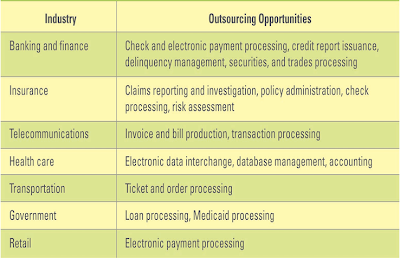Chapter 19: Outsourcing In The 21st Century
OUTSOURCING
PROJECTS
Basic options to organizations wishing to
develop and maintain their information systems:
i.
Insourcing (in-house-development): A common approach using the
professional expertise within an organization to develop and maintain the
organization’s information technology systems
·
It has
been instrumental in creating a viable of it professional and creating better
quality workforce combining both technical and business skills.
ii.
Outsourcing – An arrangement by which one organization provides
a service or services for another organization that chooses not to perform them
in-house
Types/ Forms of outsourcing options:
a) Onshore outsourcing: engaging another company within the same country
for services
b) Near shore outsourcing: contracting an outsourcing arrangement with a
company in a nearby country and often they will share a border with the native
country.
c) Offshore outsourcing: using organizations from developing countries to
write code and develop systems as the country is geographically far away.
·
Big
selling point for offshore outsourcing “inexpensive good work”
Factors drivers affecting outsourcing growth
include:
i.
Core
competencies
ii.
Financial savings
iii. Rapid
growth
iv.
Industry
changes
v. The
Internet
vi.
Globalization
§ According to PricewaterhouseCoopers “Businesses that
outsource are growing faster, larger and more profitable than those that do
not”
§ Most organizations outsource their noncore business
functions, such as payroll and IT
OUTSOURCING BENEFITS:
1. Increased quality and efficiency of a process,
service or function
2. Reduced operating expenses
3. Outsourcing non-core processes
4. Reduced exposure to risk
5. Economies of scale, expertise and best practices
6. Access to advanced technologies
7. Increased flexibility
8. Avoid costly outlay of capital funds
9. Reduced headcount and associated overhead expense
10. Reduced time to market for products or services
OUTSOURCING CHALLENGES:
1. Contract length
Ø
Most of
the outsourcing IT contracts is for a relatively long time period (several
years).
Ø
It is
because high cost of transferring assets, employees and maintaining
technological investment
The long contract causes 3 issues:
i. Difficulties in getting out of a
contract if the outsourcing service provider turns out to be unsuitable.
ii.
Problems in foreseeing future
needs
iii.
Problems in reforming an internal
IT department after the contract is finished
2. Competitive edge
3. Confidentiality
4.Scope definition





No comments:
Post a Comment